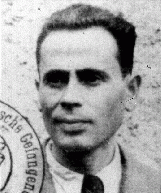
Max Liebster
Born: February 15, 1915
Reichenbach im Odenwald, Germany
Max was one of three children born to a Jewish family living in a small town in the Hessian part of Germany. His father was originally from Poland. After eight years of public education, Max completed three years of business school and learned to become a window decorator. In 1929 he found work in Viernheim, a village near Mannheim.
1933-39: Max worked for a clothing store where he was in charge of window dressing. Except for the weekends when there were Nazi marches, life was quiet in Viernheim. Right after Germany attacked Poland in September 1939, some friends picked Max up for an outing in Pforzheim-Baden. The next thing he knew, a Gestapo agent arrested him because he was Jewish. He was placed in the local prison and his property was confiscated.
1940-44: After four months Max was released from prison and sent to the Sachsenhausen concentration camp. There, by chance, he was reunited with his ailing father. When he died in April 1940, the Nazis let Max take his body to the crematorium. Between 1941 and 1943 he was interned in the Neuengamme concentration camp. Then he was deported to Auschwitz, where he helped build the Buna synthetic rubber factory operated by I.G. Farben. In January 1945 Max was force-marched to Gleiwitz and then transported to Buchenwald.
During the war Max became a Jehovah's Witness. Liberated by the U.S. Army in 1945, he settled in Aix-les-Bains, France, where he founded a Jehovah's Witness congregation.